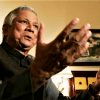Rules changed thrice in four years

The government has amended the electoral rules of Grameen Bank for the third time in four years after its previous attempts to elect nine directors from borrowers failed due to opposition from the microcredit lender.
The banks and financial institutions division on February 20 issued the amended electoral rules.
As per the rules, a three-member commission will be formed and it will be led by a deputy managing director of a state-owned bank or financial institution.
The other two members will be general managers of Grameen Bank, both of whom will be nominated by the bank chairman.
The assistant returning officer will be selected from among the bank officers by the election commission.
In April 2014, the government issued an electoral rule with provisions that a three-member election commission will be formed with an executive director of the Bangladesh Bank as its head.
The two other posts were said to be filled up by a general manager of Grameen Bank and a director of the Microcredit Regulatory Authority.
The nine elected directors of the board then protested the government move. The rules gave the central bank six months to form the commission to pick the directors.
But the BB verbally informed the finance ministry that it would not be able to hold the election as it cannot involve itself in such matters of any bank, be it public or private. This led the government to amend the rules in November that year.
The changes said the three-member body will comprise two deputy managing directors: one from a state-owned commercial bank and the other from Palli Karma-Sahayak Foundation. A former district judge will serve as the chief election commissioner.
But in the last four years the government could not implement the rules. So, the posts of the nine directors have remained vacant.
In this context, K Mozammel Haque, chairman of Grameen Bank, on July 16 last year wrote to the finance minister seeking approval to change some of the electoral provisions so that the bank can appoint one of its officials to oversee the election.
Haque's letter said the proposed changes will help in easing the current complexity as the new rules are not being applied. If the proposed amendments are approved, the election of directors could be organised in the quickest possible time, the letter said.
Finance Minister AMA Muhith held a meeting with Fazle Kabir, governor of the central bank; Md Eunusur Rahman, senior secretary of the banking division; Haque, and Ratan Kumar Nag, acting managing director of Grameen Bank, in the first week of August last year.
The new move is the outcome of the meeting.
Three government-appointed directors, including the chairman, have been running Grameen Bank since February 2015 after the tenure of the nine elected directors came to an end.
The Grameen Bank board is a 12-member body. Nine board members are directly elected by shareholders and borrowers of the bank, while the rest, including the chairman, are nominated by the government.

 For all latest news, follow The Daily Star's Google News channel.
For all latest news, follow The Daily Star's Google News channel. 








Comments